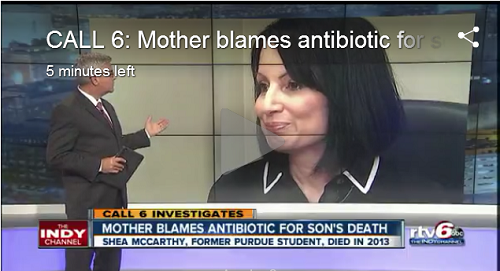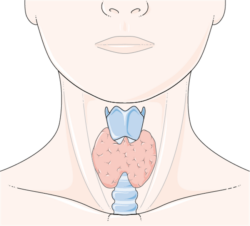In a survey of 94 people who experienced adverse reactions to Levaquin/levofloxacin, a fluoroquinolone antibiotic, 72% reported experiencing anxiety, 62% reported depression, 48% reported insomnia, 37% reported panic attacks, 33% reported brain fog and/or cognitive impairment, 29% reported depersonalization and/or derealization, 24% reported thoughts of suicide and 22% reported psychosis. Case-studies and research papers also reveal that fluoroquinolone antibiotics can cause severe psychiatric adverse reactions. Some of the studies include, Acute Psychosis Following the Use of Topical Ciprofloxacin, A Possible Case of Levofloxacin Associated Amnesia, Depression, and Paresthesia, Levofloxacin-induced acute psychosis, Ofloxacin-induced hallucinations, and others. Fluoroquinolone antibiotics, Cipro/ciprofloxacin, Levaquin/levofloxacin, Avelox/moxifloxacin and Floxin/ofloxacin, can cause severe psychiatric adverse reactions. These psychiatric adverse reactions, like other adverse reactions to fluoroquinolones that are encompassed in fluoroquinolone toxicity syndrome, can be long-lasting and are sometimes permanent.
Petitioning the FDA about Fluoroquinolone Safety
A citizen petition has been submitted to the U.S. Food and Drug Administration (FDA) requesting that increased warnings about the severe psychiatric effects of Levaquin/levofloxacin be added to the official warning labels. The petition, which was submitted by Dr. Charles Bennett of the Southern Network on Adverse Reactions (SONAR), requests that a black box warning about serious psychiatric adverse events be added to the Levaquin/levofloxacin warning label. Black box warnings are the “strongest warning that the FDA requires, and signifies that medical studies indicate that the drug carries a significant risk of serious or even life-threatening adverse effects.”
Psychiatric Side Effects of Fluoroquinolone Antibiotics: From the Survivors
The psychiatric adverse effects of fluoroquinolones are severe, life-altering and sometimes life-threatening. People with no history of psychiatric problems have experienced depression, paranoia, psychosis, anxiety, etc. after taking fluoroquinolone antibiotics. Traci describes the effects of Cipro on her mental and physical health as follows:
“It has almost been 3 years since I took a 30 day supply of Cipro for a UTI and just like most of the stories, my life has changed drastically. First came the weakness and fatigue, enough to where I would sleep for days and started wrapping my wrists, arms and feet with k tape on a daily basis. My eye sight started going bad very quickly, and just constant tingling, numbness, brittle, depression that I couldn’t control, loss of balance, anxiety, panic attacks, insomnia that lasted for days at a time, nightmares.
I’ve lost a couple of years with my children and husband that I will never get back. I left a very good job/company thinking stress was the cause and went to another smaller company only to get let go a few months after starting as I couldn’t make it to work every day.
My first doctor seemed angry when I asked her if the Cipro could be the cause and made me feel like an idiot. I went to holistic doctor, didn’t mention the Cipro this time as I thought I was wrong about the cause. She diagnosed me with fibromyalgia and chronic fatigue syndrome and wanted to run tests to find toxins in my system, but due to job loss I could no longer afford. She was on the right track and I’m grateful for the things she has taught me in my short time with her, but I am still down more days than I am up and I lost a really good salary that has put pressure on my whole family. Finally when I heard FDA announced the link to peripheral neuropathy and started reading about what Cipro has done to others I at least know I am not crazy.”
Traci’s story of multiple psychiatric symptoms, including depression, anxiety and panic attacks, and the effects of those symptoms on her life, are unfortunately familiar for many people who have taken fluoroquinolones. Another victim of Cipro/ciprofloxacin, Ruth, reported:
“A couple days after stopping the Cipro, I experienced terrifying panic attacks every time I fell asleep. It was like being shoved down into hell: a place of loneliness and terror. I had never felt fear and hopelessness like that. It was like being thrust into a horrible place from which there was no escape.”
The adverse psychiatric effects of fluoroquinolones can seem to come out of nowhere, with panic and anxiety attacks striking while doing normal activities like watching television, driving, or falling asleep. Adverse reactions to fluoroquinolones are often delayed for weeks or even months after administration of the drugs has stopped; leaving victims and physicians alike with difficulty connecting the drugs to the ensuing psychiatric problems.
Serious and Life Altering Psychiatric Side Effects
The psychiatric symptoms described by Traci and Ruth are serious and life-altering. Neither physicians nor patients currently have adequate information about the severity of adverse psychiatric effects caused by fluoroquinolone antibiotics because the psychiatric effects are currently buried in the “Central Nervous System Effects” heading of the warning label. As the citizen petition notes, these effects should have their own heading and a black box warning. Perhaps when a black box warning of serious psychiatric events is added to the warning labels for Cipro/ciprofloxacin, Levaquin/levofloxacin, Avelox/moxifloxacin and Floxin/ofloxacin it will be realized that people who are suddenly suffering from panic and anxiety attacks, insomnia, paranoia, excessive fearfulness, psychosis, bipolar disorder, etc. after taking a fluoroquinolone aren’t suddenly crazy or deciding to be difficult, they’re suffering from fluoroquinolone toxicity syndrome – an iatrogenic disease and a tragic assault to victims’ bodies and minds.
I hope that the FDA responds to Dr. Bennett and SONAR’s call for increased warnings about the psychiatric effects of fluoroquinolones by both adding the warnings requested, and by restricting the rampant use of fluoroquinolones when other, safer, antibiotics are available. Loss of mental health is not an appropriate price to pay for treatment of a urinary tract infection, traveler’s diarrhea, sinus infection or any other infection that isn’t life-threatening.
Information about Fluoroquinolone Toxicity
Information about the author, and adverse reactions to fluoroquinolone antibiotics (Cipro/ciprofloxacin, Levaquin/levofloxacin, Avelox/moxifloxacin and Floxin/ofloxacin) can be found on Lisa Bloomquist’s site, www.floxiehope.com.










